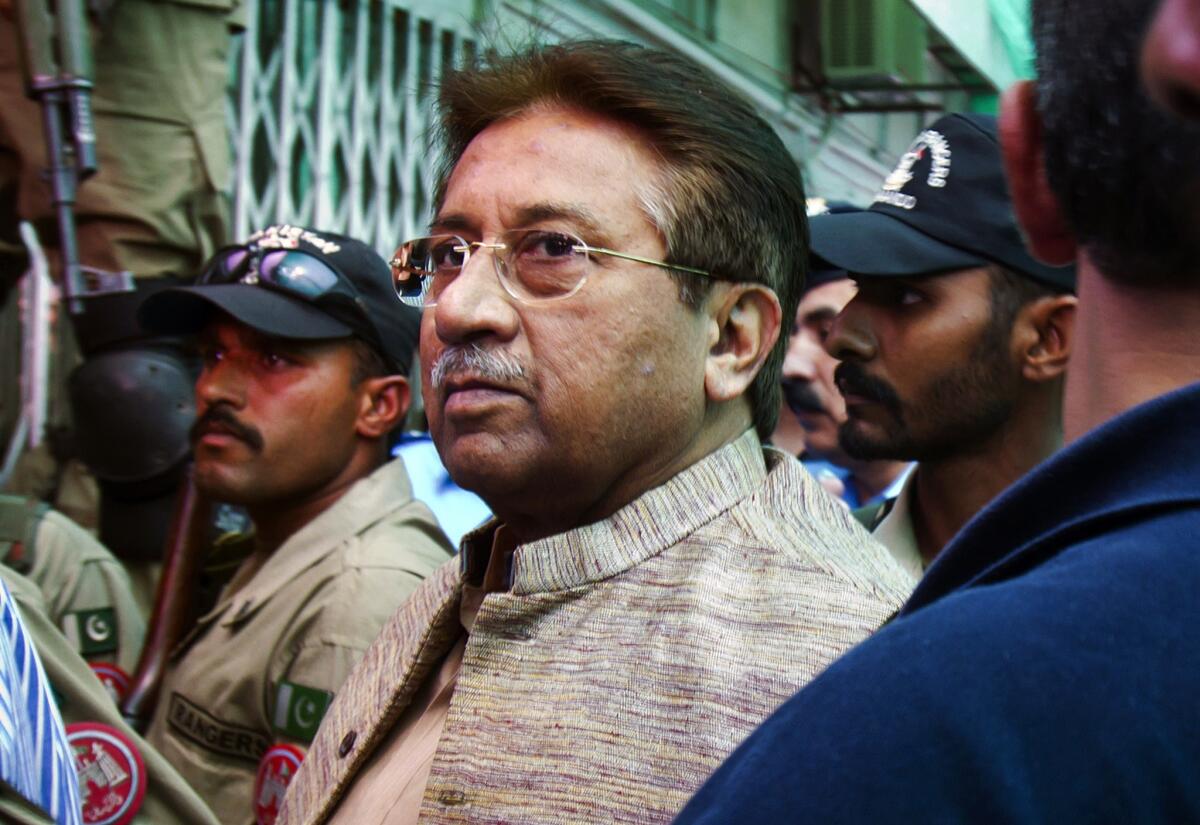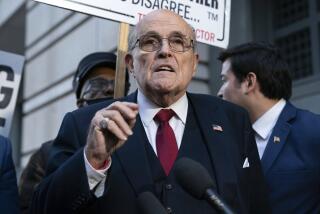Former Pakistan leader Musharraf indicted in Bhutto assassination

- Share via
ISLAMABAD, Pakistan -- Former Pakistani president and army chief Pervez Musharraf was indicted Tuesday on murder charges related to the 2007 assassination of former Prime Minister Benazir Bhutto, a sign of how far the former strongman has fallen.
Prosecutors said Musharraf, who returned to Pakistan this year from self-imposed exile hoping to participate in elections, was charged with murder, facilitation of murder and criminal conspiracy to murder in an eight-page indictment. He reportedly made no public comments at the hearing, which was closed to the media.
“He should be tried,” public prosecutor Mohammad Azhar told reporters after the 20-minute hearing.
The case was adjourned until Aug. 27, and Musharraf remains under house arrest at his farmhouse on the outskirts of the capital, Islamabad. Given threats to his security, his lawyers have asked the court to exempt him from appearing personally for future hearings.
“Musharraf is not involved in any of those charges, and obviously he denied all these charges,” said Afshan Adil, a member of Musharraf’s legal team. “He is innocent, and we expect the judiciary to do justice. However, he stands ready to face the consequences and is ready to go to jail.”
Bhutto, an iconic and charismatic leader, was killed in a suicide attack and volley of gunfire at an election rally in December 2007 in Rawalpindi, the base of Pakistani military power, as she waved to a crowd from an open-top vehicle. The then-opposition leader had recently returned after years in self-declared exile.
The Musharraf government blamed the assassination on the Taliban and said it had warned her of the danger. But a 2010 U.N. report said the killing was preventable and said Musharraf’s government didn’t provide enough protection.
Musharraf appeared before a Rawalpindi anti-terrorism court Tuesday surrounded by tight security. Six other people were also indicted in the case, including two senior police officers and four suspected militants.
Charging such a high-profile ex-army official, even one that’s seen his political fortunes decline dramatically, is highly unusual in a country ruled for decades by the military. Despite recent democratic advances, the army and intelligence agencies remain the country’s most powerful institutions, and it remains to be seen whether the formal charges will raise tensions between the military and the civilian government.
Analysts said the indictment was long overdue given that the case was initiated during the previous government and postponed several times over security concerns. “We won’t know if this is a show or a real case until the prosecution presents its case,” said Rasool Bakhsh Rais, a Lahore-based political analyst. “But politically and legally, he’s really in a lot of trouble.”
Musharraf seized power in a 1999 bloodless coup against then-Prime Minister Nawaz Sharif before stepping down nearly a decade later as his support waned sharply, made worse by his sacking of the country’s chief judge and other heavy-handed policies.
Since returning in March after four years abroad -- apparently hoping for a groundswell of support that would see him elected -- Musharraf has faced a host of legal troubles. In addition to the Bhutto case, he’s been named in a case related to the detention of judges in 2007 and in one involving the death of a Baluch nationalist leader.
Adding to his problems, Taliban insurgents have in recent weeks threatened to deploy suicide bombers to kill him. The Taliban is still angry at Musharraf’s decision to call in the army against Islamic militants at an Islamabad mosque in 2007 and his support for U.S. anti-terrorism policies.
If convicted in the Bhutto case, Musharraf reportedly could face a death sentence or life imprisonment. Although Pakistan’s military establishment may not like to see a former army chief stand trial, it’s options may be limited.
“Pakistan has changed and is changing, with growing concern that the military needs to stay in the barracks with no role in politics,” Rais said. “Slowly and gradually, they’re being pushed back.”
ALSO:
Egypt may release Mubarak as he stands trial in 2011 deaths
Britain asked to explain detention of Snowden reporter’s partner
Oscar Pistorius murder case prosecutors tell of screams, gunshots
Special correspondent Khan reported from Islamabad and Magnier reported from New Delhi.
More to Read
Sign up for Essential California
The most important California stories and recommendations in your inbox every morning.
You may occasionally receive promotional content from the Los Angeles Times.










